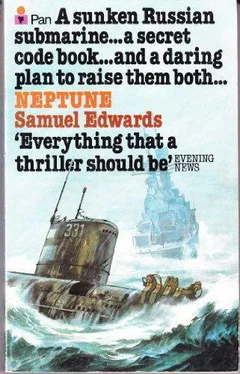Samuel Edwards - Neptune
Здесь есть возможность читать онлайн «Samuel Edwards - Neptune» весь текст электронной книги совершенно бесплатно (целиком полную версию без сокращений). В некоторых случаях можно слушать аудио, скачать через торрент в формате fb2 и присутствует краткое содержание. Город: London, Год выпуска: 1978, ISBN: 1978, Издательство: Pan Books, Жанр: Шпионский детектив, Триллер, на английском языке. Описание произведения, (предисловие) а так же отзывы посетителей доступны на портале библиотеки ЛибКат.
- Название:Neptune
- Автор:
- Издательство:Pan Books
- Жанр:
- Год:1978
- Город:London
- ISBN:0-330-25006-X
- Рейтинг книги:4 / 5. Голосов: 1
-
Избранное:Добавить в избранное
- Отзывы:
-
Ваша оценка:
- 80
- 1
- 2
- 3
- 4
- 5
Neptune: краткое содержание, описание и аннотация
Предлагаем к чтению аннотацию, описание, краткое содержание или предисловие (зависит от того, что написал сам автор книги «Neptune»). Если вы не нашли необходимую информацию о книге — напишите в комментариях, мы постараемся отыскать её.
The Russian atomic submarine ZOLOTO lies crippled and abandoned on the bed of the South China Sea. The secrets entombed inside are vital to both east and west. A custom-built super-dredger NEPTUNE assembled under maximum secrecy and plagued by agents of Soviet Russia and Red China, is bound on a clandestine salvage operation to capture the prize that could mean nothing less than world domination…
Neptune — читать онлайн бесплатно полную книгу (весь текст) целиком
Ниже представлен текст книги, разбитый по страницам. Система сохранения места последней прочитанной страницы, позволяет с удобством читать онлайн бесплатно книгу «Neptune», без необходимости каждый раз заново искать на чём Вы остановились. Поставьте закладку, и сможете в любой момент перейти на страницу, на которой закончили чтение.
Интервал:
Закладка:
Someone cheered, but suddenly fell silent. The task of raising the vessel had not yet started.
Franklin Richards stared hard at the screen, then manoeuvred the float until it stood close to the submarine, lying parallel to it. The move appeared to be made in slow-motion and lasted for an eternity, but it was completed at 1.48 p.m.
No one needed to be told that the Zoloto was resting in several feet of mud, and as the submersible continued to press forward it seemed that nothing would induce the submarine to budge.
‘Release five hundred tons of ballast on the outer edge,’ Richards directed. ‘Gently, now.’
Viewers could see iron shot rising from the lip of the float farthest from the sunken vessel, and soon that side of the submersible began to tip upward, rising until it reached a 30° angle.
This enabled the near side of the great barge to dig under the Zoloto.
Adrienne caught her breath when the submarine started to roll away from her captor.
Richards had anticipated such a development, however, and increased the speed of the manoeuvre to its maximum.
Nothing whatever happened, however, and several men groaned involuntarily.
The float continued to dig, relentlessly pushing forward.
For a breathtaking moment the submarine hesitated, and looked as though it would fall away again. Instead it began to slide on to the surface of the barge.
At 2.03 p.m. the Zoloto rested on the float.
‘Release seven hundred tons of ballast on the near side,’ Richards said. ‘Not too fast. No, a bit faster. Good!’
The submarine gradually inched towards the centre as the float righted itself.
The supreme crisis was at hand. ‘Attach full magnetic pressure to target!’ Richards ordered, and there was a ring of command in his voice.
The sound of the generator rose to a scream.
‘Turn off sonar!’
The buzzing ceased, the sonar operation no longer being needed.
The submarine was firmly attached to the submersible now, but the arduous task of raising her to the surface was just beginning.
‘Release one thousand tons of ballast from all vents. On count. Five. Four. Three. Two. One. Release!’
The tension in the operations centre was unbearable. All four sides of the lip opened simultaneously, and small, dark shapes could be seen rising from them.
The wait was interminable. Then, shuddering slightly, the submersible seemed to drift upward from the ocean bed.
‘Release all ballast instantly!’
The television screen turned a solid black, the viewers unable to see anything for some minutes as the rest of the iron shot was expelled from the submersible. The operation was concluded at 2.31 p.m.
As the screens cleared it was plain fhat the float was rising, electromagnetic power holding it on a horizontal level, with the Zoloto unmoving in its centre.
Franklin Richards changed his shirt.
A buzz of conversation filled the operations centre, and suddenly there was a call for the services of the stewards. Men who had been unable to eat were ravenous.
Richards’ voice cut through the bedlam. ‘It’s too soon for congratulations! Eat, if you wish, but continue to man all posts! We’re not out of the woods yet!’
As the float continued to rise the petrol stored in the chamber decompressed at an ever-increasing rate, reversing the process that had taken place when it had gone to the bottom. The meters attached to it indicated, at 3.24 p.m., that it had ascended more than three-quarters of a mile.
Richards took a few moments to notify the bridge of what was taking place, and Captain Humphries immediately sent a wireless message to the admiral on board the cruiser:
‘AUNT MARTHA IS DOING AS WELL AS CAN BE EXPECTED’.
Common sense told Richards and the supervisors they would be wise to eat. Nature had taken charge of the operation, and their only task now was to prevent the float from tipping so far to one side or the other that the electromagnetic hold on the Zoloto would be broken and she would sink to the bottom of the sea again.
Adrienne and Porter helped themselves to sandwiches, too. Pie wanted a beer, but no one else was drinking anything alcoholic, so he decided to wait.
Shortly after 4.00 p.m. a grinding sound alarmed everyone in the operations centre.
The voice of Captain Humphries came over the intercom.
‘Ladies and gentlemen, we’re in for a blow, so I’m extending our Denny-Brown stabilizers.’
Four fin-like devices, two on each side of the Neptune, moved out to a distance of about thirty feet. A glance out of the windows indicated that the sea was becoming choppy, and the clouds, now a deeper, darker grey, were scudding across the sky more rapidly.
A short time later the Captain came to the operations centre, pausing just long enough to look at the rising float on the television screens. ‘Frank,’ he said as he joined Richards, ‘it looks now as though the eye of the typhoon will pass about one hundred to one hundred and fifty miles to our east, but it’s still going to be one vicious storm. The winds are down to one fifteen miles per hour, but that isn’t much of a consolation.’
Richards went to the nearest television screen and pointed to the dark hulk of the Zoloto.
‘I know,’ Humphries said. ‘I’ve been watching on my own set on the bridge.’
‘All I’m trying to emphasize,’ Richards said, ‘is that I can’t call off the operation now, storm or no storm.’
‘I know.’ The Captain clasped his hands behind his back and frowned.
‘When will it hit?’
‘From now on,’ the Captain said, ‘the weather will grow steadily worse. The Navy escort will stand by with us as long as possible, but eventually they’ll have to weigh anchors and ride out the blow. I expect aircraft will be grounded in another two or three hours. At least we know that the whole Russian navy couldn’t attack us tonight, even if they knew we succeeded in snagging their submarine.’
‘It’s now four-thirty,’ Richards said, ‘and the submersible has risen about a mile and quarter. One and three-quarters still to go.’ He fed the figures into a small computer, then studied the response printed on a slip of paper. ‘She should hit the surface around seven-forty this evening.’
‘More or less simultaneously with gale winds of up to force nine. Which will grow worse through the night. Ultimately I anticipate we’ll get hurricane winds, of up to force eleven or twelve.’
‘Once the submersible reaches the surface,’ Richards said grimly, ‘it will take the better part of an hour – under normal weather conditions – to haul the submarine on board. God knows how long it will take under typhoon conditions.’
‘I’ll do my best to hold the Neptune steady for you as long as I can,’ Humphries said, ‘I’ve been a sailor long enough to know I can’t compete with the sea, and neither can you.’
‘Not even the sea,’ Richards said, ‘is going to take that submarine away from me.’
By 6.47 p.m. the submersible and her cargo were only three eighths of a mile beneath the surface, and continued to rise to the surface more rapidly than had been calculated. But the sea became rougher, too, as the winds increased, and although a full hour remained before sunset, the sky was as dark as though night had already fallen. The stabilizers checked the movements of the Neptune somewhat, but her roll was already noticeable, and she was beginning to pitch, too, which was an even more serious development. Under other circumstances she would have weighed anchor and headed into the storm, but Captain Humphries, in spite of his grave misgivings, continued to ride in place.
The minute-by-minute ascension of the barge no longer mesmerized the members of the Project Neptune staff, but the operations centre remained crowded, and no one left. The race against the storm had become the most important element in the drama still to be played.
Читать дальшеИнтервал:
Закладка:
Похожие книги на «Neptune»
Представляем Вашему вниманию похожие книги на «Neptune» списком для выбора. Мы отобрали схожую по названию и смыслу литературу в надежде предоставить читателям больше вариантов отыскать новые, интересные, ещё непрочитанные произведения.
Обсуждение, отзывы о книге «Neptune» и просто собственные мнения читателей. Оставьте ваши комментарии, напишите, что Вы думаете о произведении, его смысле или главных героях. Укажите что конкретно понравилось, а что нет, и почему Вы так считаете.












